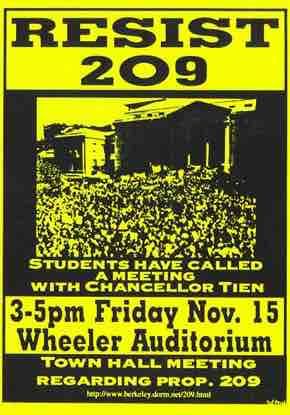In the United States, affirmative action refers to two different institutional capacities: 1) the proactive integration of minorities in settings of higher education, possibly by the use of different admissions standards and 2) equal opportunity employment measures that federal contractors are legally required to adopt. Affirmative action measures, particularly those pertaining to higher education, have been politically controversial in the United States. Though the majority of legal discussions about affirmative action have pertained to law suits, many states have had referenda on the topic. A referendum is a direct vote in which an entire electorate (citizens of particular states, in these cases) is asked to either accept or reject a particular proposal.
Major Affirmative Action Referenda in the United States
In California, Proposition 209 (the California Civil Rights Initiative) was passed in 1996 and amended the state constitution to prohibit state government institutions from considering race, sex, or ethnicity, specifically in the areas of public employment, public contracting, and public education. Proposition 209 was passed with 54% of the electorate approving of the initiative. The most controversial aspect of Proposition 209 was the element that applied to public education. Prior to the passage of the proposition, the University of California system had used mechanisms of affirmative action. Since the passage of Proposition 209, higher graduation rates have be been posted across all of the University of California, leading opponents of affirmative action to suggest a causal link between Proposition 209 and a better prepared student body. However, while minority graduation rates have risen, enrollment rates have decreased. Of the 4,422 student in UCLA's class of 2006, only 100 (2.26%) were African American. Since the passage of Proposition 209, enrollment rates for African Americans and Latinos have declined significantly, while rates have increased for Asian Americans.

Protests of California's Proposition 209
Hundreds of students protested Proposition 209 at the University of California - Berkeley.
Several other states were inspired by California's referendum. In 1998, the state of Washington sought to prohibit racial and gender preferences by state and local government. The initiative passed with 58.22% of the vote, adding the following language to Washington's laws: "The state shall not discriminate against, or grant preferential treatment to, or any individual group on the basis of race, sex, color, ethnicity, or national origin in the operation of public employment, public education, or public contracting."
The Michigan Civil Rights Initiative (MCRI, or Proposition 2), was a ballot initiative that passed into Michigan Constitutional law by a 58% to 48% vote in 2006. The MCRI was legislation aimed at stopping the preferential treatment of minorities (by race, color, sex, or religion) in receiving admission to colleges, jobs, and other publicly funded institutions. However, the MCRI was overturned by the United States Court of Appeals for the Sixth Circuit in 2011. Bill Schutte, Attorney General for the State of Michigan, announced that he was appealing the Sixth Circuit's decision, so the MCRI is in effect until the appeal is complete.
The Nebraska Civil Rights Initiative, or Initiative 424, was a 2008 ballot measure that proposed a constitutional amendment which would prohibit the state from discriminating against or granting preferential treatment to "any individual on the basis of race, sex, color, ethnicity, or national origin in the operation of public employment, public education, or public contracting." The measure, in effect, banned affirmative action at the state level. It passed with 58% of the vote.